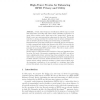Free Online Productivity Tools
i2Speak
i2Symbol
i2OCR
iTex2Img
iWeb2Print
iWeb2Shot
i2Type
iPdf2Split
iPdf2Merge
i2Bopomofo
i2Arabic
i2Style
i2Image
i2PDF
iLatex2Rtf
Sci2ools
PET
2005
Springer
2005
Springer
High-Power Proxies for Enhancing RFID Privacy and Utility
A basic radio-frequency identification (RFID) tag is a small and inexpensive microchip that emits a static identifier in response to a query from a nearby reader. Basic tags of the “smart-label” variety are likely to serve as a next-generation replacement for barcodes. This would introduce a strong potential for various forms of privacy infringement, such as invasive physical tracking and inventorying of individuals. Researchers have proposed several types of external devices of moderateto-high computational ability that interact with RFID devices with the aim of protecting user privacy. In this paper, we propose a new design principle for a personal RFID-privacy device. We refer to such a device as a REP (RFID Enhancer Proxy). Briefly stated, a REP assumes the identities of tags and simulates them by proxy. By merit of its greater computing power, the REP can enforce more sophisticated privacy policies than those available in tags. (As a side benefit, it can also provide more ...
| Added | 28 Jun 2010 |
| Updated | 28 Jun 2010 |
| Type | Conference |
| Year | 2005 |
| Where | PET |
| Authors | Ari Juels, Paul F. Syverson, Daniel V. Bailey |
Comments (0)

